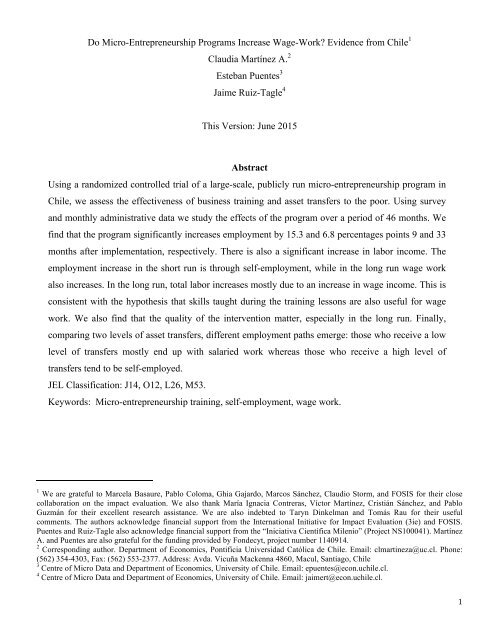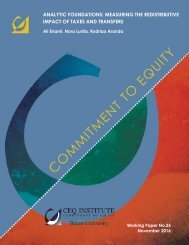DOCUMENTO
n?u=RePEc:ioe:doctra:461&r=lam
n?u=RePEc:ioe:doctra:461&r=lam
Create successful ePaper yourself
Turn your PDF publications into a flip-book with our unique Google optimized e-Paper software.
Do Micro-Entrepreneurship Programs Increase Wage-Work? Evidence from Chile 1<br />
Claudia Martínez A. 2<br />
Esteban Puentes 3<br />
Jaime Ruiz-Tagle 4<br />
This Version: June 2015<br />
Abstract<br />
Using a randomized controlled trial of a large-scale, publicly run micro-entrepreneurship program in<br />
Chile, we assess the effectiveness of business training and asset transfers to the poor. Using survey<br />
and monthly administrative data we study the effects of the program over a period of 46 months. We<br />
find that the program significantly increases employment by 15.3 and 6.8 percentages points 9 and 33<br />
months after implementation, respectively. There is also a significant increase in labor income. The<br />
employment increase in the short run is through self-employment, while in the long run wage work<br />
also increases. In the long run, total labor increases mostly due to an increase in wage income. This is<br />
consistent with the hypothesis that skills taught during the training lessons are also useful for wage<br />
work. We also find that the quality of the intervention matter, especially in the long run. Finally,<br />
comparing two levels of asset transfers, different employment paths emerge: those who receive a low<br />
level of transfers mostly end up with salaried work whereas those who receive a high level of<br />
transfers tend to be self-employed.<br />
JEL Classification: J14, O12, L26, M53.<br />
Keywords: Micro-entrepreneurship training, self-employment, wage work.<br />
1 We are grateful to Marcela Basaure, Pablo Coloma, Ghia Gajardo, Marcos Sánchez, Claudio Storm, and FOSIS for their close<br />
collaboration on the impact evaluation. We also thank María Ignacia Contreras, Víctor Martínez, Cristián Sánchez, and Pablo<br />
Guzmán for their excellent research assistance. We are also indebted to Taryn Dinkelman and Tomás Rau for their useful<br />
comments. The authors acknowledge financial support from the International Initiative for Impact Evaluation (3ie) and FOSIS.<br />
Puentes and Ruiz-Tagle also acknowledge financial support from the “Iniciativa Científica Milenio” (Project NS100041). Martínez<br />
A. and Puentes are also grateful for the funding provided by Fondecyt, project number 1140914.<br />
2 Corresponding author. Department of Economics, Pontificia Universidad Católica de Chile. Email: clmartineza@uc.cl. Phone:<br />
(562) 354-4303, Fax: (562) 553-2377. Address: Avda. Vicuña Mackenna 4860, Macul, Santiago, Chile<br />
3 Centre of Micro Data and Department of Economics, University of Chile. Email: epuentes@econ.uchile.cl.<br />
4 Centre of Micro Data and Department of Economics, University of Chile. Email: jaimert@econ.uchile.cl.<br />
1



